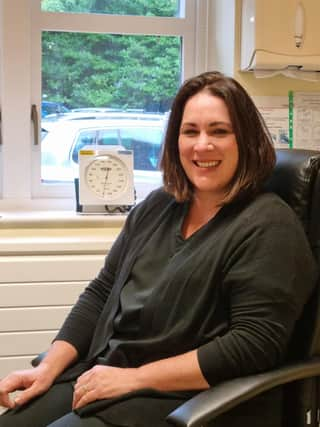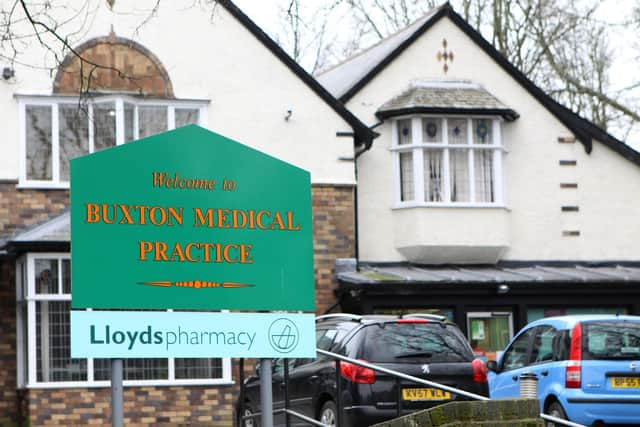New menopause clinic in the High Peak aims offer support for those struggling


Buxton Medical Practice has created a new monthly clinic for those going through the menopause where they can discuss their symptoms in a one on one environment and get the help they need.
Advanced Nurse Practitioner Natasha Fairest, from the surgery, leads the clinic and is able to diagnose and prescribe for patients.
Advertisement
Hide AdAdvertisement
Hide AdShe said: “The menopause is not just hot sweats and no periods, while that is a part of it it is so much more and the perimenopausal symptoms can start years before the actual menopause and impact on all aspects of a patient’s life.


“There is everything from brain fog, palpitations, difficulty sleeping, to anxiety, to loss of libido, to sore joints, tinnitus, urinary infections, weight problems and low mood.
“And although more people are talking about menopause now there was a time when it wasn’t discussed and women were going through these all alone with no help.
“I never want a person going through menopause to think they are alone when we are here to help, advise and even just listen.”
Advertisement
Hide AdMenopause is when a woman’s periods stop due to lower hormone levels. It usually affects women between the ages of 45 and 55, but it can happen earlier.Perimenopause is when a person has symptoms of menopause but their periods have not stopped. Perimenopause ends and a person reaches menopause and they have not had a period for 12 months.
Advertisement
Hide AdHowever, for women on hormonal contraception like the pill, coil, contraceptive implant or contraceptive injection menopausal symptoms can be masked by these types of contraceptive so people may not know if they perimenopausal.
Patient Jo Carr, 51, thinks more needs to be done to help those going through menopause.
She said: “My perimenopausal symptoms started during covid so when I was feeling more anxious I brushed it off as pandemic anxiety.
Advertisement
Hide Ad“Then I was experiencing brain fog and it would start off as daft things like trying to get out of the car with your seat belt on but then it got bigger and seeped into my work.
“There are days when try as might I couldn’t focus at all and this led me to be questioning my ability to do things I had done for years.
Advertisement
Hide Ad“I’d go home and not sleep thinking about the terrible day at work so then by the next day I’d be tired and unable to concentrate again and stuck in a vicious circle.”
Jo said everyone’s symptoms are so different it was hard to figure out what was going on.
Advertisement
Hide Ad“My periods became erratic and irregular but I had a friend who bled for five months straight as she went into perimenopause.
“It’s great people like Davina McCall has spoken about her menopausal journey recently and I feel the taboo is lifting but I think so much more can be done.
“In schools we all got the very basic of sex education. We are told of safe sex and don’t get pregnant and then it stops.
Advertisement
Hide Ad“It would be useful for the teenage children who may have a mum of a certain age who may have these symptoms to learn about what she is going through and also it will fill them with knowledge for when they are older.
Advertisement
Hide Ad“Information is key to anything in life and I know women who have had IVF to conceive started their menopause earlier than others and were surprised because they hadn’t been told but it is a common symptom.
“Now there is the internet and podcasts but even a generation ago women went through this alone with no help and didn’t chat with their friends as they didn’t want to seem like they couldn’t cope.
“So I am glad things are changing for the better and I think the menopause clinic is a great idea.”
Perimenopausal symptoms can last up to a decade, says Natasha.
Advertisement
Hide AdAdvertisement
Hide Ad“If you are struggling talk to someone you don’t have to try and do everything alone.
“There are things we can do to help.
“We can prescribe medicines, advise on counselling and lubricants.
“I know Hormone Replacement Treatment fell out of fashion as it was believed to be linked to a higher rate of breast cancer but that was only a small study conducted and views in the medicine world have now changed.
“But I don’t have people coming into the menopause clinic once and then never hear from them.
Advertisement
Hide Ad“We always have follow-on appointments and it’s not a one-size fits all approach, we will keep trying different things until you feel happy.
Advertisement
Hide Ad“I have had people who come back to me and say there life has been changed and they feel like their old self again and that’s the best feedback ever.
“Perimenopause and menopause can be a difficult, scary and lonely place and celebrities on TV don’t help by looking fabulous at 50,60, and 70 but don’t compare yourself to them.
“You will see changes in your body, your hair, your face but that is natural. You are meant to age and have lines but you don’t need to live with pain, discomfort, anxiety or any of the other symptoms which come with menopause.”
Advertisement
Hide AdAll appointments at the menopause clinic at Buxton Medical Practice must be booked in advance.
For more tips and advice there are several websites recommended by Natasha including menopausematters.co.uk and rockmymenopause.com